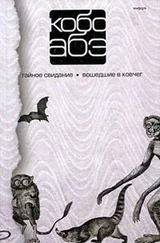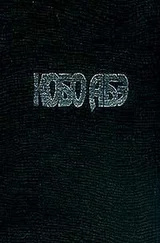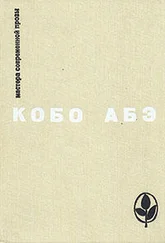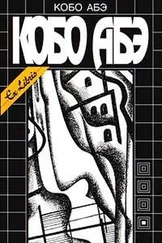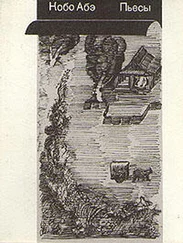Кобо Абэ - The Ark Sakura
Здесь есть возможность читать онлайн «Кобо Абэ - The Ark Sakura» весь текст электронной книги совершенно бесплатно (целиком полную версию без сокращений). В некоторых случаях можно слушать аудио, скачать через торрент в формате fb2 и присутствует краткое содержание. Год выпуска: 1988, Жанр: Современная проза, на английском языке. Описание произведения, (предисловие) а так же отзывы посетителей доступны на портале библиотеки ЛибКат.
- Название:The Ark Sakura
- Автор:
- Жанр:
- Год:1988
- ISBN:нет данных
- Рейтинг книги:3 / 5. Голосов: 1
-
Избранное:Добавить в избранное
- Отзывы:
-
Ваша оценка:
- 60
- 1
- 2
- 3
- 4
- 5
The Ark Sakura: краткое содержание, описание и аннотация
Предлагаем к чтению аннотацию, описание, краткое содержание или предисловие (зависит от того, что написал сам автор книги «The Ark Sakura»). Если вы не нашли необходимую информацию о книге — напишите в комментариях, мы постараемся отыскать её.
The Ark Sakura — читать онлайн бесплатно полную книгу (весь текст) целиком
Ниже представлен текст книги, разбитый по страницам. Система сохранения места последней прочитанной страницы, позволяет с удобством читать онлайн бесплатно книгу «The Ark Sakura», без необходимости каждый раз заново искать на чём Вы остановились. Поставьте закладку, и сможете в любой момент перейти на страницу, на которой закончили чтение.
Интервал:
Закладка:
I learned that in Epichamaic, the language spoken on Epicham Island (the insect’s native habitat), eupcaccia is the word for “clock.” Half an inch long, the insect is of the order Coleoptera, and has a stubby black body lined with vertical brown stripes. Its only other distinguishing feature is its lack of legs, those appendages having atrophied because the insect has no need to crawl about in search of food. It thrives on a peculiar diet — its own feces. The idea of ingesting one’s own waste products for nourishment sounds about as ill-advised as trying to start a fire from ashes; the explanation lies, it seems, in the insect’s extremely slow rate of consumption, which allows plenty of time for the replenishment of nutrients by bacterial action. Using its round abdomen as a fulcrum, the eupcaccia pushes itself around counterclockwise with its long, sturdy antennae, eating as it eliminates. As a result, the excrement always lies in a perfect half-circle. It begins ingesting at dawn and ceases at sunset, then sleeps till morning. Since its head always points in the direction of the sun, it also functions as a timepiece.
For a long time, islanders resisted mechanical clocks, deterred by the clockwise rotation, and by what appeared to them the suspiciously simple movements of hands measuring off the passage of time in equal units, without regard for the position of the sun. Even now it seems they refer to mechanical clocks as eupcanu, to distinguish them from “real” clocks— eupcaccia.
There was a charm to the unassuming eupcaccia that went beyond mere practical concerns. Perhaps its almost perfectly closed ecosystem was somehow soothing to troubled hearts. Guests at the Hotel Eupcaccia, the only such facility on Epicham, would come across the insects lying on flagstones (thoughtfully provided by the management) and become riveted to the spot. There were reports of a certain businessman who had sat day after day in the same place, magnifying glass in hand, and finally died raving mad, cheeks bulging with his own excrement. (He seems to have been either a Japanese watch salesman or a Swiss clock manufacturer.) All of this was doubtless more sales talk, but I chose to take it at face value.
The native population, in contrast, showed no such obsession with the insect. Around the start of the rainy season, when tourists went away, the bacterial action so crucial to the well-being of the eupcaccia would fall off, effectively slowing the progress of time. Next came the annual mating season, when time died, as the eupcaccia flew off like clock hands leaving their dials. Then impregnated females crisscrossed clumsily over the ground, fluttering wings as thin as the film on a soap bubble, as they searched for semicircles of dung on which to lay their eggs. The cycle was suspended, time invisible. The clocks shorn of hands were like claw marks on the surface of the ground, lifeless and sinister.
For all this, the islanders have never rejected time itself. The signs of regeneration are always the same.
I couldn’t help marveling at the uncanny resemblance that the eupcaccia bore to me. It was as if someone were deliberately making fun of me, yet this insect dealer had no possible way of knowing who I was.
The male customer spoke, after clucking his tongue like someone sucking on a sour plum. “Funny kind of bug,” he said. “Looks to me like it’s sulking in there.” His speech was unpleasantly moist, as if his salivary glands were working overtime. The girl looked up at him and said — her voice dry, the voice of someone sucking on a sugar candy—“Oh, let’s get one. They’re so cute.”
She smiled prettily, dimpling the corners of her naturally red lips. The man stuck out his jaw and produced his wallet with an exaggerated flourish. All at once I decided to buy one too. I felt a strong sense of intimacy with the bug — the sort of feeling aroused by the smell of your own sweat. Fastened with a pin, I would doubtless make just as novel a specimen. Whether the price of twenty thousand yen was high or low I couldn’t say, but I had a strange conviction that I had found exactly what I’d been looking for.
The eupcaccia was suspended inside its transparent acrylic container on two fine nylon threads hung at right angles, to make it visible from below as well as above. Without the clear vestiges of atrophied legs, it could have been a dung beetle with the legs torn off.
I paid my money after the couple paid theirs, and watched as the salesman inserted tablets of a drying agent into the top and bottom of the container. Then, slipping it in my pocket, I felt a great easing of tension, like stepping into a pair of comfortable old shoes. “How many does this make?” I asked. “That you’ve sold today, I mean.”
As if the question somehow offended him, the salesman kept his mouth clamped shut. His gaze was refracted in the thick lenses, making his expression hard to read. Was he just ignoring me, or had he not heard? Cheerful background music rose and fell with a passing breeze.
“As soon as I get home I’m going to get out my atlas and see if there really is such a place as Epicham Island,” I said, and then laughed. “Just kidding.” Still no reaction. Maybe I had gone too far. I hesitated to say anything more.
2
SOMEDAY I’D LIKE TO DESIGN
A LOGO BASED ON THE EUPCACCIA,
AND USE IT FOR A GROUP FLAG
Straight back from the entrance was a canvas-roofed rest area that probably doubled as a stage for outdoor concerts. Next to stands selling iced coffee and hamburgers was one selling shaved ice; I ordered a bowlful, flavored with syrupy adzuki beans. Seen through the protective wire-mesh fence, the dusty streets below looked like old torn fishnet. It seemed about to rain: mountains in the distance were swathed in clouds. The noise of thousands of car engines bounced off the sky and merged, interfering with the department-store Muzak in spurts like the gasps of a winded bullfrog.
The bowl of shaved ice and sweet purplish beans chilled my palms. People in the unroofed area were starting to head for the exits, but here nearly every seat was filled. I shared a table with a student (so I judged him to be from the long hair that fell to the nape of his slender neck, and his bloodshot eyes) wearing a dark blue T-shirt with white lettering that read PO PO PO. His face was bent over a bowl of chilled noodles. I crushed the beans in my ice with the back of my spoon, then scooped them up and ate them. The student looked up with a sound of joints cracking in his neck. Evidently he was offended by the critical gaze I had turned on him. It’s a bad habit I’ve developed ever since I started carrying the boarding passes with me. As I go out only once a month, I have to make the most of my time.
“Did you find anything?” I asked.
“Nah.” A noodle hung down on his chin; he pushed it into his mouth with a finger and added in a tone of disgust, “What a bunch of junk.”
“Even the eupcaccia?”
“The what?”
“Eupcaccia.” I pulled the plastic case out of my pocket and showed it to him. “It’s the name of an insect. Didn’t you see it? Second aisle from the back, around the middle, on the left.”
“What’s so great about it?”
“It’s a beetle, a kind of Coleopteron. The legs have atrophied, and it goes around and around in the same place like the hour hand of a clock, feeding on its own excrement.”
“So?”
“So isn’t that interesting?”
“Not especially.”
So much for him. Disqualified.
At the risk of sounding pretentious, let me say I believe the eupcaccia is symbolic of a certain philosophy or way of life: However much you may move around, as long as the motion is circular you haven’t really gone anywhere; the important thing is to maintain a tranquil inner core.
Читать дальшеИнтервал:
Закладка:
Похожие книги на «The Ark Sakura»
Представляем Вашему вниманию похожие книги на «The Ark Sakura» списком для выбора. Мы отобрали схожую по названию и смыслу литературу в надежде предоставить читателям больше вариантов отыскать новые, интересные, ещё непрочитанные произведения.
Обсуждение, отзывы о книге «The Ark Sakura» и просто собственные мнения читателей. Оставьте ваши комментарии, напишите, что Вы думаете о произведении, его смысле или главных героях. Укажите что конкретно понравилось, а что нет, и почему Вы так считаете.

